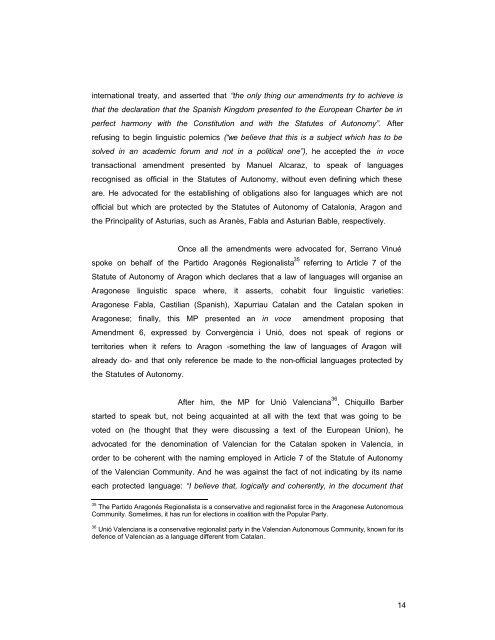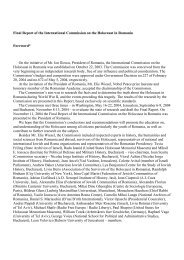get PDF document - MIRIS
get PDF document - MIRIS
get PDF document - MIRIS
You also want an ePaper? Increase the reach of your titles
YUMPU automatically turns print PDFs into web optimized ePapers that Google loves.
international treaty, and asserted that “the only thing our amendments try to achieve is<br />
that the declaration that the Spanish Kingdom presented to the European Charter be in<br />
perfect harmony with the Constitution and with the Statutes of Autonomy”. After<br />
refusing to begin linguistic polemics (“we believe that this is a subject which has to be<br />
solved in an academic forum and not in a political one”), he accepted the in voce<br />
transactional amendment presented by Manuel Alcaraz, to speak of languages<br />
recognised as official in the Statutes of Autonomy, without even defining which these<br />
are. He advocated for the establishing of obligations also for languages which are not<br />
official but which are protected by the Statutes of Autonomy of Catalonia, Aragon and<br />
the Principality of Asturias, such as Aranès, Fabla and Asturian Bable, respectively.<br />
Once all the amendments were advocated for, Serrano Vinué<br />
spoke on behalf of the Partido Aragonés Regionalista 35 referring to Article 7 of the<br />
Statute of Autonomy of Aragon which declares that a law of languages will organise an<br />
Aragonese linguistic space where, it asserts, cohabit four linguistic varieties:<br />
Aragonese Fabla, Castilian (Spanish), Xapurriau Catalan and the Catalan spoken in<br />
Aragonese; finally, this MP presented an in voce amendment proposing that<br />
Amendment 6, expressed by Convergència i Unió, does not speak of regions or<br />
territories when it refers to Aragon -something the law of languages of Aragon will<br />
already do- and that only reference be made to the non-official languages protected by<br />
the Statutes of Autonomy.<br />
After him, the MP for Unió Valenciana 36 , Chiquillo Barber<br />
started to speak but, not being acquainted at all with the text that was going to be<br />
voted on (he thought that they were discussing a text of the European Union), he<br />
advocated for the denomination of Valencian for the Catalan spoken in Valencia, in<br />
order to be coherent with the naming employed in Article 7 of the Statute of Autonomy<br />
of the Valencian Community. And he was against the fact of not indicating by its name<br />
each protected language: “I believe that, logically and coherently, in the <strong>document</strong> that<br />
35 The Partido Aragonés Regionalista is a conservative and regionalist force in the Aragonese Autonomous<br />
Community. Sometimes, it has run for elections in coalition with the Popular Party.<br />
36 Unió Valenciana is a conservative regionalist party in the Valencian Autonomous Community, known for its<br />
defence of Valencian as a language different from Catalan.<br />
14












